| Construction Rating: | starstarstarstarstar |
| Flight Rating: | starstarstarstarstar_border |
| Overall Rating: | starstarstarstarstar_border |
| Manufacturer: | Qmodeling  |
 (Contributed - by
Darren J Longhorn)
(Contributed - by
Darren J Longhorn) Brief:
The MRS-Vega is part of Q Modeling's Mega Retro Series. The series comprises
upscale semi-clones of some classic designs, that also includes the Mars
Snooper, NikeX & WACC. I say semi-clones, because the kits have been
rescaled and designed from scratch using new parts and the latest techniques.
The Vega is described as an upscale of the original Estes Starship Vega, rather
than a clone of the larger, and later, Estes Super Vega, and builds to an
impressive 820mm tall rocket.
I was supplied with this kit by Deepsky Rocket Shop, on the proviso that I write a review for their spanking new web site, an offer which I found far too good to refuse. If you haven't checked out Deepsky's new web site yet, I strongly suggest you do. It not only has a large range of kits and materials, but also tips, recommendations, customer reviews and a great online ordering system.
Construction:
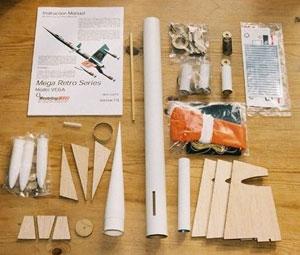 The kit includes:-
The kit includes:-
- 1 x Main Nose cone - cast resin
- 1 x Main Nose Cone Plug - laser cut basswood
- 1 x Eye Hook
- 1 x Main Body Tube
- 3 x Upper Fins - laser cut balsa
- 3 x Primary Fins - laser cut balsa
- 3 x Secondary Fins- laser cut balsa
- 2 x Launch Lugs - these must be cut from a single piece
- 1 x Engine Hook
- 1 x Motor Mount - foil lined
- 1 x Rear Centring Ring - laser cut basswood
- 1 x Thrust Ring
- 4 x Hex Rings - laser cut balsa
- 3 x Support Brace - laser cut balsa
- 3 x Fin Brace - laser cut balsa
- 1 x Forward Centering Ring - laser cut basswood
- 3 x Landing Gear Pad - laser cut basswood
- 3 x Landing Gear Centering Pad - laser cut basswood
- 3 x Landing Gear Tube
- 3 x Landing Gear Shaft - need to be cut from a single length of dowel
- 9 x Landing Gear Centering Ring - laser cut basswood
- 16 x Water-Slide Decals
- 1 x Stick-On Decal
- 1 x Snap Swivel
- 1 x Heat Shield - Nomex
- 1 x Parachute - pre assembled nylon
- 1 x Shock Cord - Kevlar
- 1 x Small Spider
Yes, that's right, a spider. It was dead when I opened the bag, but had been very much alive when I first received the kit. I was quite relieved when I found it dead, since I didn't know whether it had jumped aboard at Deepsky or Q Modeling, and I'm not sure what kinds of spiders they have in California!
Instruction ManualThe 18 page instruction manual for this kit is of the highest quality. The build is broken down into major sections, Nose Cone Preparation, Engine Mount Assembly & Installation, Landing Gear / Primary Fin Assembly, Final Assembly, Making a D-Engine Spacer, and Finishing. Each section has an estimated time for completion, though I can't comment on their accuracy, as I was simultaneously working in had two or three kits.
Each major section is further broken down into a number of steps. For each of these steps, there is a detailed diagram and textual description. I dare say that you could build exclusively from either the pictures or text alone! There is even a comprehensive pre-launch check list. The instruction manual is labelled Version 7, so it looks like Q Modeling issue revisions from time to time. The the latest version of the instructions is available for download, in Adobe Portable Document Format, from the Q Modeling web site, so it's worth checking to see if there have been any updates, before you begin. Nose Cone Preparation
As previously mentioned, the nose cones appear to be cast from some kind of resin. There are a few mould lines but, being resin, they are very easy to sand out. There is a little excess resin on the shoulder of the cones, left over from the casting. The instructions suggest removing this excess with a modeling knife or razor saw, but it's quite thick and I found it easier to accomplish with a razor saw.
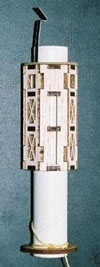
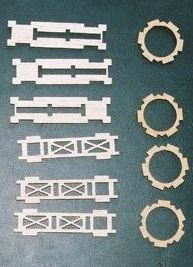
Engine Mount Assembly & Installation
Initially I was puzzled by the motor mount, as it seemed unnecessarily elaborate. It was only really when I came to build it that I realized it was an innovative solution to the perennial problem of fin alignment. The result is an interlocking construction forming rigid slots into which the fins may be inserted. The rigidity and alignment of these slots ensure perfectly-aligned fins every time. A triumph of design and laser cutting!
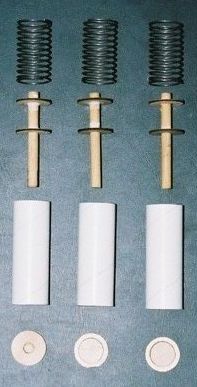 Landing Gear
/ Primary Fin Assembly
Landing Gear
/ Primary Fin Assembly
For me, this was the most interesting part of the build, the spring-loaded feet are really cool. Given the attention to detail shown in the rest of the parts, it's strange that the three landing gear shafts are provided as a single piece that must be cut to
length. I'm not really complaining though, it would feel odd to build the whole kit and not to have to cut something out!
You have to be a bit careful with the assembly of the landing gear. It's important that the glue doesn't stray onto the moving parts, otherwise the Vega would be in for some hard landings! As always though, the instructions are very clear and straightforward, so no-one should have any trouble.
There are only really two additions I would make to the instructions. The first is to suggest filling the gaps around the landing gear nose cones with light weight filler, rather then the suggested wood glue. The wood glue shrinks as it dries and doesn't really do a good job of filling what is quite a deep gap.
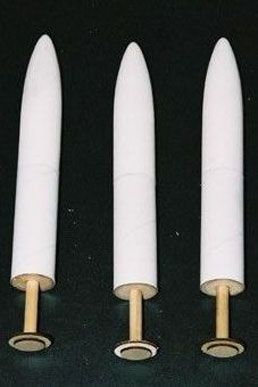 The other suggestion I would make is to paint the
landing gear shafts before assembly. The reason being that the additional
thickness of the paint can interfere with the movement. The landing gear on my
kit was very free moving before painting, but sticks a bit now that the paint
is on. I'll probably sand them down and repaint before flying again, but it's
going to be a fiddly job.
The other suggestion I would make is to paint the
landing gear shafts before assembly. The reason being that the additional
thickness of the paint can interfere with the movement. The landing gear on my
kit was very free moving before painting, but sticks a bit now that the paint
is on. I'll probably sand them down and repaint before flying again, but it's
going to be a fiddly job.
To be fair, the instructions do mention to take care during painting and not to gum up the landing legs, but it's hard to apply paint and not build up additional thickness.
Final AssemblyAs previously described, the alignment of the main fins is due to the novel motor mount. You really can't go wrong. The other fins are surface mounted, but because of the thickness of the fins, this is easily accomplished. The instructions suggest mounting them with CA and then adding wood glue fillets, and this worked very well.
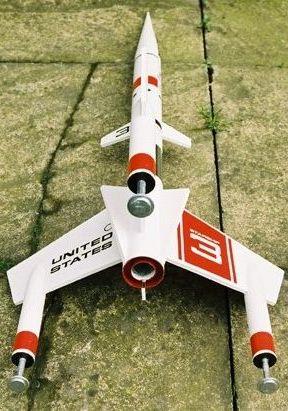 Making a D-Engine Spacer
Making a D-Engine Spacer A curious omission really. It wouldn't have added much to the cost to include this in the kit. But, as suggested, it's easy enough to make from a spent motor casing.
Finishing
I used Halfords high-build primer on the main fins. This helps to fill the grain, and smooth out any imperfections in the filler around the landing gear pods. Once dried and sanded I coated the entire rocket with ordinary white primer to create a consistent base coat. A little more light sanding and then two coats of Halfords Diamond White was applied.
The provided water slide decals are very good. Really quite thin, but not thin enough to be easily broken. They do have a slight tendency to stretch though, possibly die to the large size. So you need to take care, particularly when applying the large decals to the fins. One of the decals is of the self adhesive kinds. I don't normally like self adhesive decals, as they are usually thick and curl up at the edges. This one is relatively thin, however, and it's difficult to see how else the metallic finish could have been achieved. You do have to be a bit careful though The black pattern on mine has smudges in one area. Not quite sure what I might have had on my fingers to achieve that!
A final coat of Halfords lacquer was applied to help seal the decals and protect from the inevitable finger and scuff marks.
Construction Rating: 5 out of 5
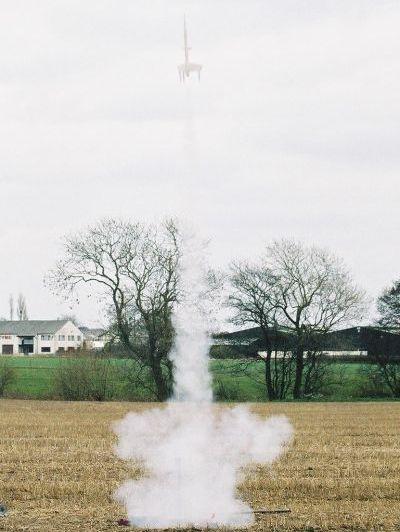 Flight
Flight As mentioned above, there is a pre launch check list included in the instruction manual. Obviously most of us won't need that, but it's a great introduction for any newcomers to the hobby. Once the Vega had been painted, I test-flew it at the WRS launch on 10th April 2004. I had wanted to wait until the decals had been applied, but I ran out of time. The weather conditions at the launch were almost ideal for a first flight, as there was very little in the way of wind, just a gentle breeze.
The recommended motors are Estes D12-3 and E9-4, but I see no reason why single use or RMS AP motors, with suitable delay, could not be substituted. For the first flight, I chose to stick with Estes. The boost was really straight, with deployment at apogee. The descent was really quite gentle and stable. If it hadn't landed in a ploughed field, it might have stayed upright on its feet.
Flight Rating: 4 out of 5
ConclusionQ Modeling can't be faulted for this kit. It's an excellent interpretation of a classic design and builds into an impressive rocket. At £46.95, the Vega can't be described as cheap, but very few corners have been cut here. The combination of top quality components, innovative design and comprehensive instruction manual, means that even a novice should have no trouble building and flying this kit.
Overall Rating: 4½ out of 5
Other Reviews
- Qmodeling VEGA By Stu Young (November 21, 2009)
Brief: Upscale of an Estes vintage exotic kit. Construction: 2 17" cardboard body tubes, 3 cardboard tubes for landing leg pods, steel springs for the shock-absorbing landing legs, high-quality, laser-cut balsa fins and motor mount "exoskeleton," reflective, heat-resistant coating inside 24 mm motor mount, steel engine retaining hook (long enough for a BP ...
- Qmodeling VEGA By Chan Stevens
Brief: This kit is a beautiful upscale and upgrade to the Estes classic Starship Vega. Magnificently engineered and loaded with top-quality components and features, this rocket would be a great addition to any BAR's fleet. From what I can tell, upgrades to the original design include nose cones on the wing pods/landing gear, a fully functional set of shock absorbers in the landing gear, ...
- Qmodeling VEGA By Jeff Drongowski
QModeling of Temecula, CA has put together a great looking upscale remake of the old Estes Vega rocket. The kit has always been one of the more interesting looking "retro" rockets put in to flight and QModeling has done a fine job with this kit. She is a single stage, single motor, parachute recovered (with real spring loaded landing pods as part of the fins) model made of paper tubes, ...
 |
 |
Flights
 |
 |
T.D. (September 11, 2003)
T.P.Q. (February 5, 2004)
 |
 |
R.L. (September 11, 2003)